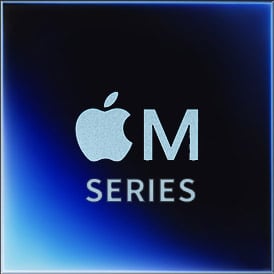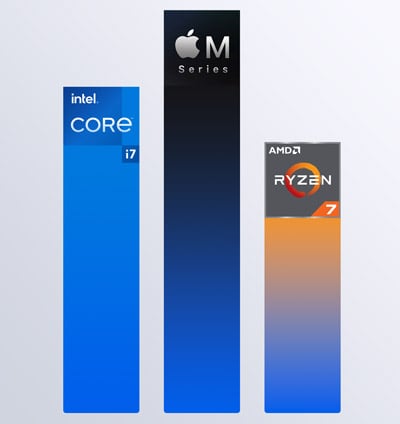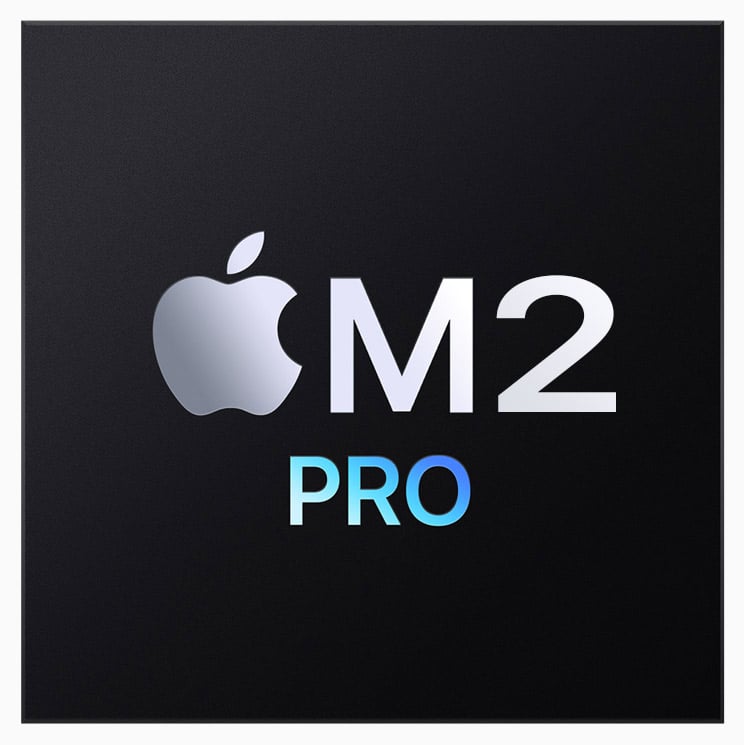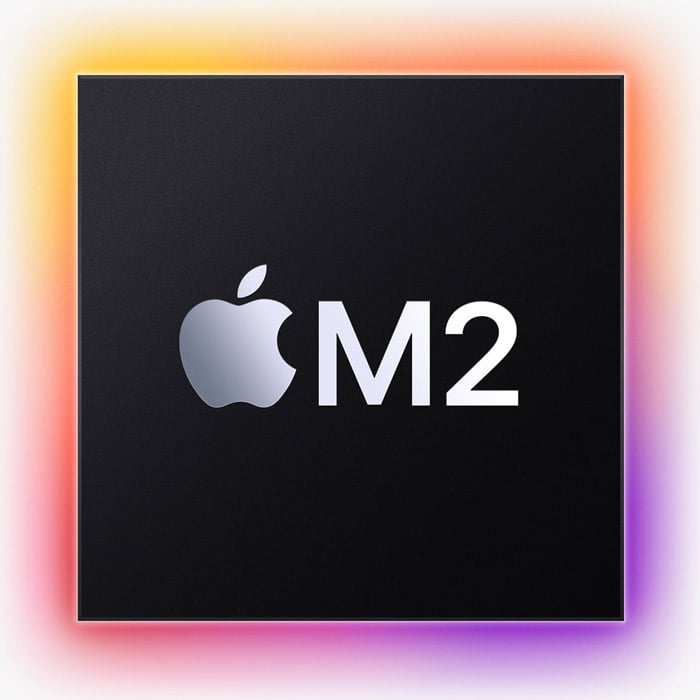
Apple M1 (7-GPU) vs Apple M2
Last updated:
CPU comparison with benchmarks

|
 |

|
| Apple M1 (7-GPU) | Apple M2 | |
CPU comparisonApple M1 (7-GPU) or Apple M2 - which processor is faster? In this comparison we look at the differences and analyze which of these two CPUs is better. We compare the technical data and benchmark results.
The Apple M1 (7-GPU) has 8 cores with 8 threads and clocks with a maximum frequency of 3.20 GHz. Up to 16 GB of memory is supported in 2 memory channels. The Apple M1 (7-GPU) was released in Q4/2020. The Apple M2 has 8 cores with 8 threads and clocks with a maximum frequency of 3.50 GHz. The CPU supports up to 24 GB of memory in 2 memory channels. The Apple M2 was released in Q2/2022. |
||
| Apple M series (23) | Family | Apple M series (23) |
| Apple M1 (9) | CPU group | Apple M2 (8) |
| 1 | Generation | 2 |
| M1 | Architecture | M2 |
| Mobile | Segment | Mobile |
| -- | Predecessor | Apple M1 |
| -- | Successor | Apple M3 |
|
|
||
CPU Cores and Base FrequencyThe Apple M1 (7-GPU) is a 8 core processor with a clock frequency of 0.60 GHz (3.20 GHz). The Apple M2 has 8 CPU cores with a clock frequency of 0.66 GHz (3.50 GHz). |
||
| Apple M1 (7-GPU) | Characteristic | Apple M2 |
| 8 | Cores | 8 |
| 8 | Threads | 8 |
| hybrid (big.LITTLE) | Core architecture | hybrid (big.LITTLE) |
| No | Hyperthreading | No |
| No | Overclocking ? | No |
| 0.60 GHz (3.20 GHz) 4x Firestorm |
A-Core | 0.66 GHz (3.50 GHz) 4x Avalanche |
| 0.60 GHz (2.06 GHz) 4x Icestorm |
B-Core | 0.60 GHz (2.42 GHz) 4x Blizzard |
Artificial Intelligence and Machine LearningProcessors with the support of artificial intelligence (AI) and machine learning (ML) can process many calculations, especially audio, image and video processing, much faster than classic processors. Algorithms for ML improve their performance the more data they have collected via software. ML tasks can be processed up to 10,000 times faster than with a classic processor. |
||
| Apple M1 (7-GPU) | Characteristic | Apple M2 |
| Apple Neural Engine | AI hardware | Apple Neural Engine |
| 16 Neural cores @ 11 TOPS | AI specifications | 16 Neural cores @ 15.8 TOPS |
Internal GraphicsThe integrated graphics unit of a processor is not only responsible for the pure image output on the system, but can also significantly increase the efficiency of the system with the support of modern video codecs. |
||
| Apple M1 (7 Core) | GPU | Apple M2 (10 Core) |
| 0.39 GHz | GPU frequency | 0.45 GHz |
| 1.30 GHz | GPU (Turbo) | 1.40 GHz |
| 1 | GPU Generation | 2 |
| 5 nm | Technology | 5 nm |
| 2 | Max. displays | 2 |
| 112 | Compute units | 160 |
| 896 | Shader | 1280 |
| No | Hardware Raytracing | No |
| No | Frame Generation | No |
| 8 GB | Max. GPU Memory | 24 GB |
| -- | DirectX Version | -- |
Hardware codec supportA photo or video codec that is accelerated in hardware can greatly accelerate the working speed of a processor and extend the battery life of notebooks or smartphones when playing videos. |
||
| Apple M1 (7 Core) | GPU | Apple M2 (10 Core) |
| Decode / Encode | Codec h265 / HEVC (8 bit) | Decode / Encode |
| Decode / Encode | Codec h265 / HEVC (10 bit) | Decode / Encode |
| Decode / Encode | Codec h264 | Decode / Encode |
| Decode / Encode | Codec VP9 | Decode / Encode |
| Decode | Codec VP8 | Decode |
| No | Codec AV1 | No |
| Decode | Codec AVC | Decode |
| Decode | Codec VC-1 | Decode |
| Decode / Encode | Codec JPEG | Decode / Encode |
Memory & PCIeThe Apple M1 (7-GPU) supports a maximum of 16 GB of memory in 2 memory channels. The Apple M2 can connect up to 24 GB of memory in 2 memory channels. |
||
| Apple M1 (7-GPU) | Characteristic | Apple M2 |
| LPDDR4X-4266 | Memory | LPDDR5-6400 |
| 16 GB | Max. Memory | 24 GB |
| 2 (Dual Channel) | Memory channels | 2 (Dual Channel) |
| 68.2 GB/s | Max. Bandwidth | 102.4 GB/s |
| No | ECC | No |
| 16.00 MB | L2 Cache | 20.00 MB |
| -- | L3 Cache | -- |
| 4.0 | PCIe version | 4.0 |
| -- | PCIe lanes | -- |
| -- | PCIe Bandwidth | -- |
Thermal ManagementThe TDP (Thermal Design Power) of a processor specifies the required cooling solution. The Apple M1 (7-GPU) has a TDP of 18 W, that of the Apple M2 is 20 W. |
||
| Apple M1 (7-GPU) | Characteristic | Apple M2 |
| 18 W | TDP (PL1 / PBP) | 20 W |
| -- | TDP (PL2) | -- |
| 25 W | TDP up | 30 W |
| 10 W | TDP down | 10 W |
| -- | Tjunction max. | 100 °C |
Technical detailsThe Apple M1 (7-GPU) has a 16.00 MB cache, while the Apple M2 cache has a total of 20.00 MB. |
||
| Apple M1 (7-GPU) | Characteristic | Apple M2 |
| 5 nm | Technology | 5 nm |
| Chiplet | Chip design | Chiplet |
| Armv8.5-A (64 bit) | Instruction set (ISA) | Armv8.5-A (64 bit) |
| Rosetta 2 x86-Emulation | ISA extensions | Rosetta 2 x86-Emulation |
| -- | Socket | -- |
| Apple Virtualization Framework | Virtualization | Apple Virtualization Framework |
| Yes | AES-NI | Yes |
| macOS | Operating systems | macOS, iPadOS |
| Q4/2020 | Release date | Q2/2022 |
| -- | Release price | -- |
| show more data | show more data | |
Rate these processors
Average performance in benchmarks
⌀ Single core performance in 4 CPU benchmarks
⌀ Multi core performance in 6 CPU benchmarks
Cinebench 2024 (Single-Core)
The Cinebench 2024 benchmark is based on the Redshift rendering engine, which is also used in Maxon's 3D program Cinema 4D. The benchmark runs are each 10 minutes long to test whether the processor is limited by its heat generation.
|
|
Apple M1 (7-GPU)
8C 8T @ 3.20 GHz |
||
|
|
Apple M2
8C 8T @ 3.50 GHz |
||
Cinebench 2024 (Multi-Core)
The Multi-Core test of the Cinebench 2024 benchmark uses all cpu cores to render using the Redshift rendering engine, which is also used in Maxons Cinema 4D. The benchmark run is 10 minutes long to test whether the processor is limited by its heat generation.
|
|
Apple M1 (7-GPU)
8C 8T @ 3.20 GHz |
||
|
|
Apple M2
8C 8T @ 3.50 GHz |
||
Cinebench R23 (Single-Core)
Cinebench R23 is the successor of Cinebench R20 and is also based on the Cinema 4 Suite. Cinema 4 is a worldwide used software to create 3D forms. The single-core test only uses one CPU core, the amount of cores or hyperthreading ability doesn't count.
|
|
Apple M1 (7-GPU)
8C 8T @ 3.20 GHz |
||
|
|
Apple M2
8C 8T @ 3.50 GHz |
||
Cinebench R23 (Multi-Core)
Cinebench R23 is the successor of Cinebench R20 and is also based on the Cinema 4 Suite. Cinema 4 is a worldwide used software to create 3D forms. The multi-core test involves all CPU cores and taks a big advantage of hyperthreading.
|
|
Apple M1 (7-GPU)
8C 8T @ 3.20 GHz |
||
|
|
Apple M2
8C 8T @ 3.50 GHz |
||
Geekbench 5, 64bit (Single-Core)
Geekbench 5 is a cross plattform benchmark that heavily uses the systems memory. A fast memory will push the result a lot. The single-core test only uses one CPU core, the amount of cores or hyperthreading ability doesn't count.
|
|
Apple M1 (7-GPU)
8C 8T @ 3.20 GHz |
||
|
|
Apple M2
8C 8T @ 3.50 GHz |
||
Geekbench 5, 64bit (Multi-Core)
Geekbench 5 is a cross plattform benchmark that heavily uses the systems memory. A fast memory will push the result a lot. The multi-core test involves all CPU cores and taks a big advantage of hyperthreading.
|
|
Apple M1 (7-GPU)
8C 8T @ 3.20 GHz |
||
|
|
Apple M2
8C 8T @ 3.50 GHz |
||
Geekbench 6 (Single-Core)
Geekbench 6 is a benchmark for modern computers, notebooks and smartphones. What is new is an optimized utilization of newer CPU architectures, e.g. based on the big.LITTLE concept and combining CPU cores of different sizes. The single-core benchmark only evaluates the performance of the fastest CPU core, the number of CPU cores in a processor is irrelevant here.
|
|
Apple M1 (7-GPU)
8C 8T @ 3.20 GHz |
||
|
|
Apple M2
8C 8T @ 3.50 GHz |
||
Geekbench 6 (Multi-Core)
Geekbench 6 is a benchmark for modern computers, notebooks and smartphones. What is new is an optimized utilization of newer CPU architectures, e.g. based on the big.LITTLE concept and combining CPU cores of different sizes. The multi-core benchmark evaluates the performance of all of the processor's CPU cores. Virtual thread improvements such as AMD SMT or Intel's Hyper-Threading have a positive impact on the benchmark result.
|
|
Apple M1 (7-GPU)
8C 8T @ 3.20 GHz |
||
|
|
Apple M2
8C 8T @ 3.50 GHz |
||
iGPU - FP32 Performance (Single-precision GFLOPS)
The theoretical computing performance of the internal graphics unit of the processor with simple accuracy (32 bit) in GFLOPS. GFLOPS indicates how many billion floating point operations the iGPU can perform per second.
|
|
Apple M1 (7-GPU)
Apple M1 (7 Core) @ 1.30 GHz |
||
|
|
Apple M2
Apple M2 (10 Core) @ 1.40 GHz |
||
Estimated results for PassMark CPU Mark
Some of the CPUs listed below have been benchmarked by CPU-monkey. However the majority of CPUs have not been tested and the results have been estimated by a CPU-monkey’s secret proprietary formula. As such they do not accurately reflect the actual Passmark CPU mark values and are not endorsed by PassMark Software Pty Ltd.
|
|
Apple M1 (7-GPU)
8C 8T @ 3.20 GHz |
||
|
|
Apple M2
8C 8T @ 3.50 GHz |
||
Blender 2.81 (bmw27)
Blender is a free 3D graphics software for rendering (creating) 3D bodies, which can also be textured and animated in the software. The Blender benchmark creates predefined scenes and measures the time (s) required for the entire scene. The shorter the time required, the better. We selected bmw27 as the benchmark scene.
|
|
Apple M1 (7-GPU)
8C 8T @ 3.20 GHz |
||
|
|
Apple M2
8C 8T @ 3.50 GHz |
||
CPU performance per watt (efficiency)
Efficiency of the processor under full load in the Cinebench R23 (multi-core) benchmark. The benchmark result is divided by the average energy required (CPU package power in watts). The higher the value, the more efficient the CPU is under full load.
|
|
Apple M1 (7-GPU)
7,759 CB R23 MC @ 18 W |
||
|
|
Apple M2
8,558 CB R23 MC @ 20 W |
||
Performance for Artificial Intelligence (AI) and Machine Learning (ML)
Processors with the support of artificial intelligence (AI) and machine learning (ML) can process many calculations, especially audio, image and video processing, much faster than classic processors. The performance is given in the number (trillions) of arithmetic operations per second (TOPS).
|
|
Apple M1 (7-GPU)
8C 8T @ 0.60 GHz |
||
|
|
Apple M2
8C 8T @ 0.66 GHz |
||
Blender 3.1 Benchmark
In the Blender Benchmark 3.1, the scenes "monster", "junkshop" and "classroom" are rendered and the time required by the system is measured. In our benchmark we test the CPU and not the graphics card. Blender 3.1 was presented as a standalone version in March 2022.
|
|
Apple M1 (7-GPU)
8C 8T @ 3.20 GHz |
||
|
|
Apple M2
8C 8T @ 3.50 GHz |
||
Devices using this processor |
|
| Apple M1 (7-GPU) | Apple M2 |
| Unknown | Apple MacBook Air 14 (2022) Apple MacBook Pro 13 (2022) |
News and articles for the Apple M1 (7-GPU) and the Apple M2

Most popular processors in the first half of 2022
Posted by Stefan on 2022-07-05
In the past we had repeatedly written about our most popular processors. Since this format was quiet popular, I would like to continue this today and introduce you the most popular processors in the first half of 2022.
With more than 2 million page views per month, CPU-Monkey is one of the biggest comparison sites for processors and is currently available in 16 languages.
With more than 2 million page views per month, CPU-Monkey is one of the biggest comparison sites for processors and is currently available in 16 languages.

Apple M2 Pro with more CPU cores and production in 3 nm ?
Posted by Stefan on 2022-06-28
After Apple surprisingly presented the normal Apple M2 processor as the first successor to the Apple M1 already in June 2022, the Apple M2 Pro and the Apple M2 Max may follow in autumn. The difference in performance compared to the basic version could be even greater this time and range from 25 to 40 percent.
In this article we describe how Apple could realize this and why the price should also go up.
In this article we describe how Apple could realize this and why the price should also go up.

Apple M2 vs Apple M1 - What are the differences?
Posted by Stefan on 2022-06-09
During WWDC 2022 on June 6th, 2022 Apple surprisingly presented its new Apple M2 processor. This will initially be installed in a completely revised Apple MacBook Air with 13.6 inches, a even thinner form factor and new colors. Apple also updated the already known (old) Apple MacBook Pro 13.3 with touch bar.
Many leakers had counted on Apple not presenting its new second-generation M processor until the fall. But things turned out differently. And there is very likely a reason for that: the improvements in the Apple M2 are limited compared to the predecessor.
Many leakers had counted on Apple not presenting its new second-generation M processor until the fall. But things turned out differently. And there is very likely a reason for that: the improvements in the Apple M2 are limited compared to the predecessor.
Popular comparisons containing this CPUs
back to index











